-
PARIS MOVIE JOURNAL (Oct.-Nov. 2016)
Paris Movie Journal (Oct.-Nov. 2016)
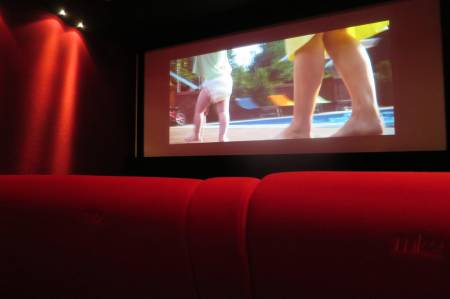
Link index to PARIS MOVIE JOURNAL reviews:
Le ciel attendra (Marie-Castille Mention-Schaar 2016)
Fille inconnue, La/The Unknown Girl (Luc, Jean-Pierre Dardennes 2016)
Le fils de Jean (Phlippe Lioret 2016)
Frantz (François Ozon 2016)
Girl on the Train, The (Tate Taylor 2016)
Handmaiden/Mademoiselle (Park Chan-wook 2016)
I, Daniel Blake (Ken Loach 2016)
Juste la fin du monde/It's Only the End of the World (Xavier Dolan 2016)
Ma vie de courgette/My Life As a Courgette (Claude Barras 2016)
Mal de pierres/From the Land of the Moon (Nicole Garcia 2016)
On revient de loin (Pierre Carles, Nina Faure 2016)
L'Odyssée (Jérôme Salle 2016)
Poesia sin fin (Alejandro Jodorowsky 2016)
Réparer les vivants/Mend the Living (Katell Quillévéré 2016)
Toni Erdmann (Maren Ade 2016)
================================================== =======================================
XAVIER DOLAN: IT'S ONLY THE END OF THE WORLD (2016)
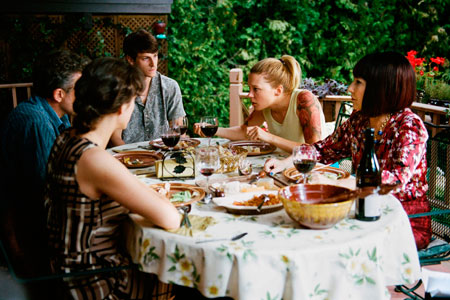
CASSEL, COTILLARD, ULLIEL, SEYDOUX AND BAYE IN JUSTE LA FIN DU MONDE
Just the end of our patience with Xavier Dolan
He's 26 and this is his sixth feature, and the Québécois wunderkind still loves more than anything making movies about relatives yelling at each other, never more annoyingly than here. It started with the not-too-subtly titled I Killed My Mother/J'ai tué ma mère, which appeared to have strong autobiographical elements - though he didn't kill his mother, nor did the character in the movie, for that matter. His greatest success, and no less intense, a difficult watch, was the movie before this, the 2014 cell-phone-formatted Mommy, about working-class French-Canadian mom and her struggle with her bratty, psychologically challenged young son.
Dolan has said he feels this is his first work as an adult. That may mean that it's not autobiographical, he didn't write it, and it's not French Canadian. You could call this August, Osage Country for French people, except that it has very little plot. At least it's only an hour and a half, not three hours, but it still goes on far too long. It's adapted from a play by Jean-Luc Lagarce, who died of AIDS in 1995. It's about a successful playwright who comes back to see his family for the first time in twelve years, in his mid-thirties, planning to tell them he's dying. But he doesn't, and AIDS isn't mentioned.
This time Dolan used his growing clout to film in France with an all-star team, perhaps picked as much for their fame as their appropriateness to the play. They are Gaspard Ulliel, Nathalie Baye, Léa Seydoux, Vincent Cassel, and Marion Cotillard. You won't like the characters they play, and you will pity Gaspard Ulliel's meek, semi-mute protagonist, Louis-Jean Knipper, the sick, returning playwright.
Dolan has precocious cinematic gifts, and the ability to get involved in every aspect of a production, including costumes and decor, a gift for the visual. That could have a down side: that he also likes to craft the film down to the actors, allowing them too little freedom to improvise and breathe. You feel that right away because of how the ladies are made up and coiffed to look their worst and least like themselves. Cassel is even more grotesquely obnoxious than he was in My King last year. He's Antoine, Louis-Jean's brittle, insecure older brother, who is repetitious and nasty. Ulliel is meek and polite. It's not that he looks so terribly unwell - just that he's less terrific-looking and chic than usual. One would like to hear more from Louis-Jean, because he's the only nice person on screen. But one is puzzled by his tendency to be a doormat, since he's stayed away from these loser relatives so long for a good reason. He wants to make peace with his past. But it's a useless project. They're too busy squabbling and being self-absorbed to react to him.
Huge control is shown not only in the odd coiffures of the femmes, but in the up-tight camerawork, which a lot of the time doesn't allow us to see the cast below the neck. The film has a stylish look, is handsomely photographed, and neatly edited in coordination with calculatingly intrusive music. All this just makes you feel as just as brutalized as poor Louis-Jean.
It's Just the End of the World/Juste la fin du monde, 95 mins., debuted at Cannes May 2016, winning the Grand Prix and Prize of the Ecumenical Jury (and later the Best Actor César for Ulliel); a dozen other festivals, released theatrically in France 21 Sept. 2016, it has done relatively well with local critics (AlloCiné press rating 3.3, marred by some strong dissenters who find this simply an irritating, claustrophobic psychodrama), but few English-speaking critics, perhaps rightly this time, have had anything good to say (other than Peter Bradshaw of the Guardian; the Metacritic rating is a miserable 48%, and a word frequently used for the film is "inert."
Last edited by Chris Knipp; 01-22-2022 at 01:48 PM.
-
NICOLE GARCIA: MAL DE PIERES/FROM THE LAND OF THE MOON
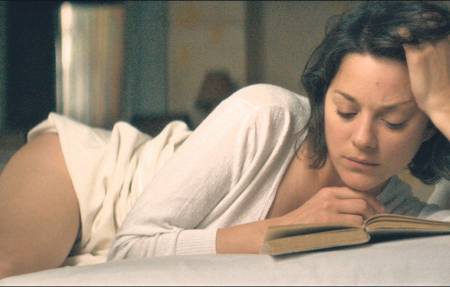
MARION COTILLARD IN MAL DE PIERRES
Magic Mountains
"Gabrielle (Marion Cotillard) comes from a small village in the South of France, at a time when her dream of true love is considered scandalous, and even a sign of insanity. Her parents marry her to José (Alex Brendemühl), an honest and loving Spanish farm worker who they think will make a respectable woman of her. Despite José's devotion to her, Gabrielle vows that she will never love José and lives like a prisoner bound by the constraints of conventional post-World War II society until the day she is sent away to a cure in the Alps to heal her kidney stones. There she meets André Sauvage (Louis Garrel), a dashing injured veteran of the Indochinese War, who rekindles the passion buried inside her. She promises they will run away together, and André seems to share her desire. Will anyone dare rob her of her right to follow her dreams?"
That's an IMDb plot summary for this new film by Nicole Garcia, which opened in France today, 12 Oct. 2016. It's nice to see Marion Cotillard looking beautiful and being full-on passionate again after her unflattering role in Xavier Dolan's tiresome It's Only the End of the World. It's also enjoyable the way Nicole Garcia likes to take us for a wild ride, as she did in her pleasingly mysterious - and more contained and interesting - 2013 Un beau dimanche/Going Away. And this is terribly romantic. Having Marion Cotillard and Louis Garrel fall in love in a Swiss sanatorium provides an exotic new dose of French movie glamor.
Adapted by the bestselling Strega-prize wining novella by the Sardinian writer Milena Agus, this is like Nicolas Sparks in French, on acid. It transfers events from Italy to France, and considerably simplifies the plot. Set in the post-war period, it focuses on an eccentric, strong-willed and sensuous woman who's put in an arranged marriage with a Spanish man when she's over thirty. Both swear they will never love each other. The husband is allowed to see prostitutes but his wife Gabrielle starts taking the prostitute's role to save them money. They try to have a child but her painful kidney stones cause repeated miscarriages. Her husband sends her to the cure in the mountains so she can have a baby, and she does. You think you know exactly where things are going, because there is a frame tale, and a very long flashback, so we know what's up with Gabrielle in the present, so when we see her finally meet Louis Garrel's dreamily ill French army officer back from Vietnam at the mountain water cure resort, and he plays Tchaikovsky's "Barcarole" so beautifully on the piano, we think we know what's going to happen.
The plot pitches us a couple of curves that feel unconvincing. The movie explanation is less convincing than the novella's, and and also winds up confusing the ongoing issue of whether Gabrielle is crazy or not. Once we get to the mountains, there are some very nice scenes and the watered-down "Magic Mountain" sequences are engaging. Cotillard and Garrel and even the underappreciated Brendemühl get to do some nice work - that doesn't, however, quite work.
A lot of the early stuff is unnecessary. It should not take so long to show Gabrielle is unhappily married, and is looking for a great love. In all the establishing scenes one feels one is being force-fed; in the mountain "cure" ones, that one is being offered a cartload of sweet pastries. Screen International calls this "an old-fashioned romantic weepie," but it pitches too many curves to provide that kind of simple satisfaction.
at Cannes May 2016, four other festivals; French theatrical release 19 Oct. 2016. Again a film well received by French critics (AlloCine press rating 3.6) that English critics have little use for (Metacritic score 42%). Screened for this review at UGC Odéon Paris on 19 Oct. 2016.
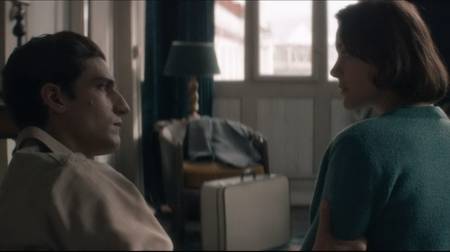
LOUIS GARREL AND MARION COTILLARD IN MAL DE PIERRES
Last edited by Chris Knipp; 02-17-2017 at 02:41 PM.
-
FRANÇOIS OZON: FRANTZ (2016)
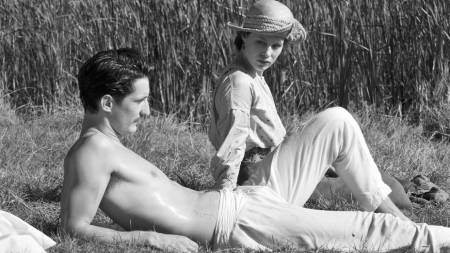
PIERRE NINEY AND PAULA BEER IN FRANTZ
Ozon redoes the postwar romance in fine style
Ozon's new Frantz at times seems terminally tasteful and tame, impeccably set in post WWI trappings and filmed in handsome black and white (with discreet color segments) that makes everything and everyone look pleasingly generic. Primarily it's a nice vehicle for its two young protagonists, the rising French star Pierre Niney (ex-Comédie Française and the official film YSL) and the promising German newcomer (so awarded at Venice) Paula Beer. Niney plays Adrien Rivoire, the mysterious slim young Frenchman who appears in the little German town cemetery where Anna (Beer) pays daily homage at the grave of her late fiance, Frantz Hoffmeister (Anton von Lucke), killed in the war.
As is his wont Ozon teases and puzzles us. And yet still he lays out points with absolute clarity. When Adrien explains who he is, it takes a while for Frantz's father, Doktor Hoffmeister (Ernst Stötzner) to accept him. But then everybody does. Later comes a shocking surprise that amateur script-doctors may have guessed; and concealment goes on, while the impact of the surprise is muted, some are protected from it, and it's then viewed from various angles.
If nothing gathers intense emotional power, Frantz touches on various intriguing themes. First is the pacifist one. A beer-drinking gang of bereaved German fathers are made to consider that they caused the war and sent their sons off to die in it. Frantz's favorite poet was Verlaine and French was his and Anna's secret language and she is fluent in French as Adrien is in German. But nationalism can't be banished with cultural affinities and a few pious generalizations. One is somewhat in the territory of Vercors' Le silence de la mer, the subject of Jean-Pierre Melville's first film, about the German Occupation officer who just loves everything French; but whose delusions become painful, while all along his humble French "hosts" refuse to ever utter a word to him.
In his Venice review for Variety Jay Weissberg points out that in Frantz Ozon is remaking Ernst Lubitsch’s anti-war drama Broken Lullaby, "expanding the melodrama while soft-pedaling the pacifism." More than that Ozon may see the pacifism as a mere teaser, or a red herring. With these two attractive people (Niney and Beer) drawn (impossibly?) to each other, there is much material for melodrama. But Ozon is having most fun with deception, surprise, and mysterious portents, including multiple hints (with reference to a painting in the Louvre by Manet) of the possibility, or temptation, of suicide. Frantz isn't as clever, sensuous, and certainly not as eccentric and provocative as some of Ozon's previous films. But in a world of kitsch excess, it does stand out. It is an elegant and beautifully made movie. In Hollywood Reporter Boyd van Hoeij saw the French:/German mirroring effects as signs of "a master storyteller."
Fratnz, 113 mins., in German and French, debuted at Venice, where Paula Beer won the Best Young Actress award. Nine other festivals including Busan, Telluride, Toronto, and London. French theatrical release 7 Sept. 2016 (AlloCiné press rating 3.7/33). The anglophone critics' rating is a bit more lukewarm (Metacritic 63). The film is also included in the Rendez-Vous with French Cinema 2 Mar. 2017(with Ozon) and 11 Mar., and its US theatrical release is 15 Mar., Bay Area 24 Mar.
For the full plot, see Wikipedia.
Last edited by Chris Knipp; 10-02-2018 at 10:51 AM.
-
MAREN ADE: TONI ERDMANN (2016)
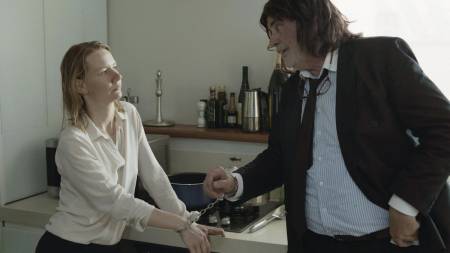
SANDRA HÜLLER AND PETER SIMONISCHEK IN TONI ERDMANN
Maren Ade's festive comedy
In Maren Ade's Toni Erdmann, which is more special and original than it may seem, a goofy, slightly over-the-hill father teaches his ultra-serious corporate daughter some lessons about life. In two words, he teaches her to lighten up. The film is rambling, and may seem overlong. It may indeed contain some unnecessary longeurs. But it needs to be this way. It's teaching viewers about the kind of patience and alertness in life's most boring times, leading to transcendence, that David Foster Wallace talks about in his famous 2005 Kenyon College commencement address titled "This is Water." And the film builds and builds, slowly. There needs to be moment when you think it's just tedious and pointless. Because Ade avoids making her "points" (except that it's a simplification to denote them so) in any obvious way.
Reports of this film came from Cannes, where it was the European critics' favorite and thought a contender for the top Competition prize, but it didn't get that. It's not a movie everyone will like. Mike D'Angelo, whose Cannes reports I've been following since his arresting "Open Letter to Lars von Trier" from the festival in 2009, loved Tony Erdmann and reported it had gotten unusual spontaneous applause (as had Holy Motors and a few others in his Cannes years) because it has a number of "glorious moments" that are "designed to blindside you," and are "in keeping with the first character we meet, Winfried Conradi (Peter Simonischek)." Simonischek is a big, shambling man with a shaggy-dog mop of grey hair, which is important)." He's the father, a devotee of practical jokes (think Lord of Misrule). When his beloved dog Willy dies, he takes a long vacation from his job as a schoolteacher. We've seen him there leading a celebratory song where he and all the students are wearing fright mask makeup, with ugly fake teeth.
Winfried doesn't take off the makeup for a while. He decides to pay a surprise visit to his daughter Ines (Sandra Hüller, wiry, tough, and fearless), in Bucharest, where she's currently working. At first he really annoys Ines. His jokes are invasive and out of place, though there's something touching and sweet about him, and them. Gradually his behavior gets through to Ines, in a good way. Ines has a key position - she lives in a large, glamorous apartment and is her boss's most important staff member, but she must also always struggle against male chauvinism in the business world, working twice as hard. A key aspect of Ade's film is that she, like Winfried, is viewed with kindness and understanding. She is heroic and tireless, going from dealings with staff to a big presentation, juggling shifts from English to German, supplely always seeming to agree with criticisms to maintain the upper hand.
Ines' heroism shows particularly in how she handles her father, especially when she tells him he must go (not just a woman executive's reaction: anyone would be upset by a father like this) and he says goodbye - then reappears in a fright wing with the fake teeth calling himself "Toni Erdmann," and saying he's a "life coach." Indeed Ines has one, whom she consults with via Skype, but Toni Erdmann's sense of the title is broader than how to win at business; it's really how to live. So anyway Ines remains patient with him. His imposture is too outrageous to expose to associates and colleagues; it would be too embarrassing; but she also shows remarkable forbearance and discipline in managing to fit him in. And as she does this, gradually his touching excesses of humor (and they are excesses: he has little control over them) show her how much she's been destroyed by an excess of the seriousness and self-discipline she's marshaled to perform her demanding job; that it's not worth it. That she's become cold and unkind, soulless.
None of this is spelled out, though. It's embodied in a long succession of bizarre incidents interwoven with the fractured details of Ines' high-pressure, accomplished, unfun life, incidents in which her father shows her how good will and human kindness, the willingness to do good spontaneously, to act outside a plan, are missing from her life.
Partly the film is the story of two dysfunctional personalities who bring out each other's rehabilitation by expressing the love they feel for each other. In fact, for a while as sometimes Ines out-crazies her father, D'Angelo notes father and daughter's "relationship grows ever more dysfunctional, even as it seems likely that 'Toni' is the only thing keeping Ines from throwing herself out the window of her high-rise apartment." We get a full view of Ines' life as it now is, but also a full view of its life-affirming disruption. The lesson the meandering, enlightening action teaches is like the rediscovery of the natural and the wild spirits in man embodied in ancient ritual and revived in what C.L. Barber desceribed as "Shakespeare's Festive Comedy." It's not a "magical cure" for all Winfried's "daughter's unhappiness," as D''Angelo notes. But it's a statement, through very particular events, off a general set of valences in the world, and how the spirit of play and ability to laugh are essential to us. It recognizes that the clowns are not the real lunatics.
The strength of Toni Erdmann lies in how it uses humble material, crude humor, and an almost real-time progression of incidents, to deliver something that could be corny in a subtle, natural way. This is even like an Adam Sandler movie, specifically his That's My Boy, D'Angelo notes "a few wags" saying. And yet it's nothing like. It's perhaps like a bizarre home video. The combination didn't win the big prizes at Cannes, but did win the FIPRESCI Prize there, and other awards elsewhere.
Tony Erdmann, in German and English, 162 mins., debuted at Cannes in Competition (FIPRESCI Prize); over two dozen other international festivals including Telluride, Toronto, New York, London, and Mill Valley. Screened 20 Oct. 2016 at the Saint-André-des-Arts II cinema 12 rue Git le Coeur, Paris. It opened 17 Aug. in France; still showing at 8 cinemas in Paris. French critical response ecstatic (AlloCiné press rating 4.3, 86%, based on 32 reviews); the Anglophone critics' response this time is similar: Metacritic score 94%.
Last edited by Chris Knipp; 11-25-2023 at 11:07 PM.
-
LUC, JEAN-PIERRE DARDENNES: THE UNKNOWN GIRL/LA FILLE INCONNUE (2016)
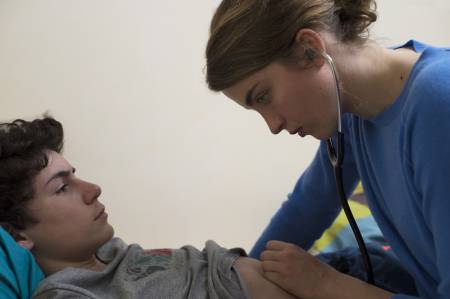
LOUKA MINNELLA AND ADÈLE HEENEL IN THE UNKNOWN GIRL
Another dogged pursuit, harder to care about
The Belgian directors Luc and Jean-Pierre Dardenne are masters of about moral awakenings and obsessive pursuits of a task. Here is another one of those, if more of the latter than of the former.
In La promesse, which put them on the map, it was a teenage son (the start for the great Jérémie Renier) in defiance of his mean father (the equally great Olivier Gourmet) keeping a pledge to do right by an abused immigrant. In Rosetta, a teenage girl (Émilie Dequenne) is in desperate, tireless pursuit of a decent job to escape her alcoholic mother. In The Son/L'Enfant, a carpentry teacher (Gourmet again) pursues the boy who killed his son, with ambivalent motive but a final moving shift toward forgiveness. In The Child (Renier again) a young man seeks to sell his own baby, but comes to see the wrong of this desperate and ignorant act. Lorna's Silence is far more complicated, but involves the protagonist's desperate struggle to open her own business The Kid with the Bike, starring another young discovery, young firecracker Thomas Doret, with the luminous Cécile de France, follows a boy's desperate (and useless) effort to reunite with his father (Renier, grown up now), who has abandoned him.
The Dardennes used a big star, Marion Cotillard, for Two Days, One Night, typically about a desperate pursuit during the allotted time in the title to persuade a group of coworkers to vote against a bonus so she can be allowed back to work after a nervous breakdown. It's a dogged, exhausting story, but an actress as good and as appealing as Cotillard and a suspenseful plot, it holds our attention till the last.
The Unknown Girl/La fille inconnue is typical Dardennes material. But both because of the theme and the lead actress, despite attentive craftsmanship to every scene, the whole film feels less involving or moving. It's about young Liège general practitioner Jenny Davin Adèle Haenel), who attempts to uncover the identity of a would-be patient who has died after she has ignored her desperate effort to be admitted after hours. This is a task not involving moral development so much as perhaps an act of penance, and relief of a guilty conscience. Adèle Haenel has shone in dry, feisty roles, and that aspect is tamped down here, but she lives up to expectations: convincing as the businesslike young doctor, she is relatable, if not adorable, and Jenny achieves her goal. She has the necessary convincing dedication and tireless intensity. But as written, the character does not significantly change.
The story is neatly told; one scene rapidly follows another. And yet, since Jenny is juggling doctoring with crime investigating, the narrative proceeds unevenly. Sometimes it's hard to see if she is doing her job as a doctor, or pretending to as an excuse to contact various people and press them for details of the unidentified woman, showing her photo on her smart phone. The latter was African, a prostitute, connected with drug dealers, and so Jenny winds up sticking her nose into places where she isn't welcome. The film starts to seem like a police procedural conducted ay an amateur - without the suspense such tales normally involve. The cops even approach Jenny at one point to tell her she's marring their process by spooking potential sources. And then there is the case of Julien (newcomer Olivier Bonnaud), an intern working with Jenny whom she pursues with equal doggedness after a child having an epileptic fit apparently shocks him so much he decides to give up training in medicine. She even goes to see him out home in the country to have a heart-to-heart talk. It apparently succeeds, she learns from a phone call. However involving, this story seems tacked on. As has happened sometimes before, this is an unmistakable Dardennes film, but not one that shakes you to the core as the best ones do.
The Unknown Girl/La fille inconnue, 113 mins., debuted at Cannes in competition May 2016; 13 other festivals; French theatrical release 12 Oct. 2016, also included in the main slate of the New York Film Festival; US premiere that day. French critical response mild (AlloCiné press rating 3.2/30). Screened 21 Oct. 2016 at MK2 Odéon, Paris.
Last edited by Chris Knipp; 10-23-2016 at 11:59 AM.
-
PHILIPPE LIORET: LE FILS DE JEAN/JEAN'S SON (2016)
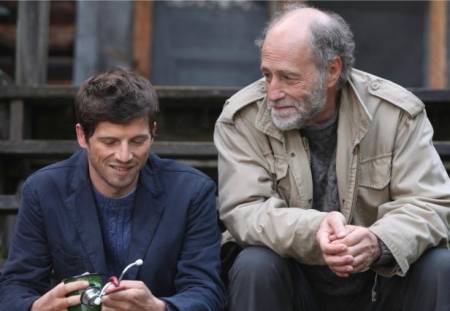
PIERRE DELADONCHAMPS AND GABRIEL ARCAND IN LE FILS DE JEAN
Detective work on oneself, in Canada
Thirty-five year-old Parisian divorcee Matthieu (Pierre Deladonchamps, of Stranger by the Lake, who has the charming, weary smile of Patrick Bruel) has a six-year-old son he sees on weekends. Dedication to a demanding job in business keeps him (we later learn) from his true love, writing crime novels; he's written only one, but it was quite successful. One day he gets a phone message from Quebec that his father, whom he's never known, in fact didn't know was alive, has died, and left him a package. His father was Jewish (he didn't know that either) and the internment will be in a couple days. He flies to Montreal, and the film focuses on the few days of Matthieu's sojourn in Canada and its surprises and revelations. Lioret works quietly, subtly to unfold a tale built of many small details, a search for personal identity and fatherhood played as a mystery story.
Matthieu is met at the airport by Pierre (Canadian stage vet Gabriel Arcand, brother of Denys), his late father's longtime doctor friend, who at first, for a while actually, isn't very friendly. Matthieu isn't interested in the internment, only in meeting the two brothers he's just found out about. Pierre agrees only if Matthieu doesn't reveal who he is.
It also turns out the father died while fishing on a lake, probably of a heart attack, and his body has not been recovered. The two brothers (Pierre-Yves Cardinal, who's worked with Xavier Dolan; and Partick Hivon), decide to search again on the lake, and Matthieu gets involved, pretending to be a friend on vacatio. Pierre goes too, to prevent revelations. There's nonetheless a violent drunken quarrel between the brothers that reveals misunderstandings about inheritance. Later Matthieu, whose identity Pierre has revealed to his own family, gets friendly with Pierre's daughter and two little granddaughters, and eventually receives another revelation from his wife.
Deladonchamps, boyish yet not young, self-contained yet pulsing with withheld emotion, with those big lips and open eyes, is a compelling presence. Arcand has quiet authority, and can go from brusque and unkind to reaching out and concerned in the blink of an eye. Whether the action seems to you revelatory or just corny, Deladonchamps and Arcand are fun to watch together, or apart (Deladonchamps has scenes with other people), and Lioret obviously knows this. And the Quebecois world provides a fascinating strangeness too that heightens the sense of the contrast, then growing rapprochement between the two men.
The outdoor sequences up on the big woodsy lake provides a nice break between the urban and interior ones; but wildness comes from one of the brothers back in Montreal later too, and Matthieu gets a bloody nose.
Lioret explored another kind of family mystery with his 2006 Don't Worry, I'm Fine, an important vehicle for Mélanie Laurent and Kad Merad as film actors. He has explained that the new scenario grew out of a novel he was long interested in, Jean-Paul Dubois' Si ce livre pouvait me rapprocher de toi ("If this Book Could Bring Me Close to You"), which [i]Cahiers du Cinéma calls "treacly," but he says he's just used its most rudimentary elements. Deladonchamps deserves to be a bigger star.
Le fils de Jean ("Jean's Son"), 98 mins., debuted Aug. 2016 at Angoulême; also Warsaw Oct.; French theatrical release 31 Aug. 2016. Well received (AlloCiné press rating 3.5/25) but not by all: Les Inrockuptibles found it preachy and sentimental; Le Monde compared the Arcand-Deladonchamps duo to Claude Sautet's films, but thought it was weakened by timidity and too much restraint, and Lioret is that way sometimes. Screened 23 Oct. 2016 at UGC Odéon, Paris.
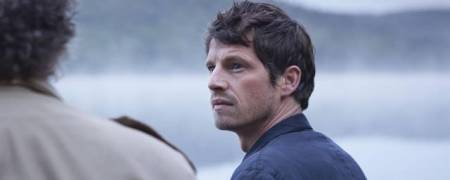
PIERRE DELADONCHAMPS IN LE FILS DE JEAN
Last edited by Chris Knipp; 10-23-2016 at 12:10 PM.
 Posting Permissions
Posting Permissions
- You may not post new threads
- You may not post replies
- You may not post attachments
- You may not edit your posts
-
Forum Rules






 Reply With Quote
Reply With Quote







Bookmarks